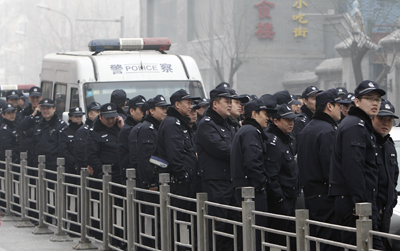California-based China Digital Times (CDT) reports new Chinese-language Twitter commentators have appeared in the last week. Twitter is generally blocked in China, but heavily used by activists who access it by means of proxy networks overseas. The recent arrivals are vocal supporters of the government’s efforts to tamp down nascent “Jasmine Revolution” rallies anonymously organized in Chinese cities the past two Sundays.
“Some of these accounts have forged the names of activists and even included avatar photos of dissidents and activists,” CDT reports. Yet the tone of the comments resembles that of the so-called “Fifty Cent Party,” an informal name given to commentators hired by local government authorities to promulgate propaganda in online forums, according to CDT.
Several of the messages appear intended to discredit international news reports. One February 21 message, from user yiwannianaini, reposts other Twitter user links about the protests with the comment: “Once again, foreigners are stirring things up and trying to set Chinese people against each other.” Another alongside a summary of a BBC Chinese news report reads, “Most information online is fake. Rumors!”
One foreign journalist, who asked not to be identified because they were not authorized to speak for their news outlet, told CPJ by e-mail of a flood of personal threats and abuse received via Twitter in the past week–including death threats.
These concerning developments are reminiscent of pre-Olympics Beijing in 2008, when at least 10 Beijing-based journalists were anonymously threatened, and nationalistic commentators tore apart international coverage of riots in Tibet. Back then, the Chinese government denied encouraging the xenophobic activity. They did nothing to discourage it either: Foreign Ministry spokeswoman Jiang Yu characterized foreign media coverage as “provocative, biased, and unfair.”
The official attitude toward the foreign press corps has not evolved in the past three years. Jiang was on duty again Tuesday, responding to journalists’ outrage at the detentions and assault they and colleagues met with while reporting at the site of protests on Sunday. The Associated Press described the press conference as “testy.” Jiang “seemed to imply that reporters who went to the leisure spots in Shanghai and Beijing were part of an anti-China plot,” according to AP.
The Foreign Ministry should condemn the use of force by police and security officials on Sunday. It should also act to protect international journalists who are the targets of online abuse. Information authorities in China have the capacity to block sensitive keywords from the Internet at a moment’s notice. They have already arrested several bloggers they suspect of posting information about the revolution. It is clear that if the government wanted to do something about this they could, but they have chosen not to speak out. Allowing anti-media sentiment to develop will not discourage news of anti-government activity, but it could put the foreign press corps at real risk.
